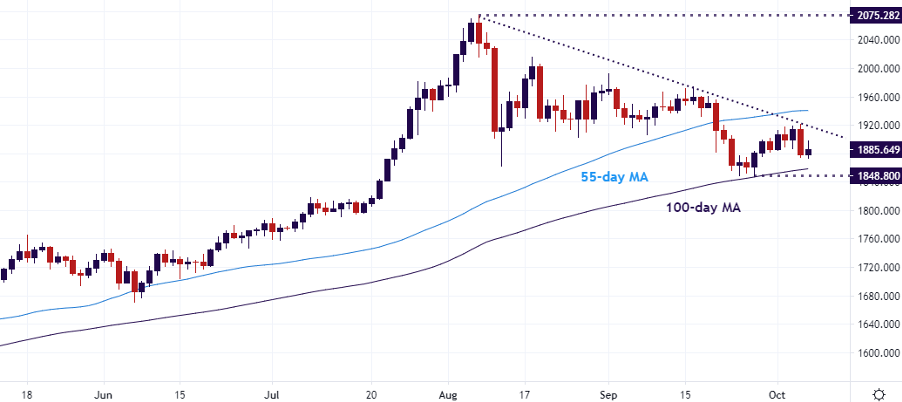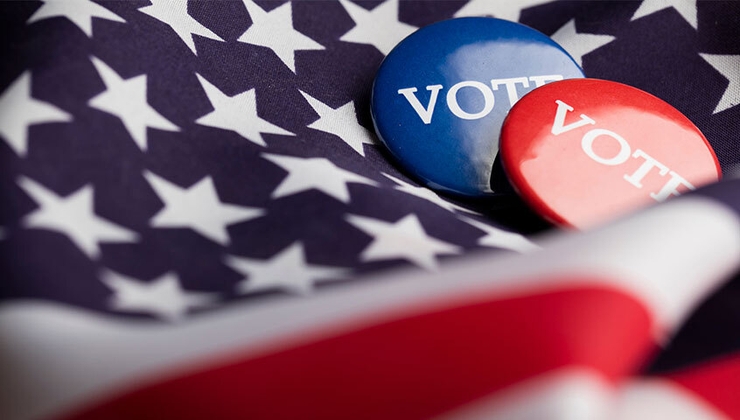- English (UK)
How to trade gold into the US presidential election
As we draw closer to election day, recent price action has been mixed along with dollar performance, but a Biden victory and the reflation trade will give a bid to the yellow metal going forward.
2020 catalysts
Spot gold prices have enjoyed this year in a rally fuelled by concerns about the huge cost of emergency responses to the pandemic. This safe-haven demand, along with declines in real (inflation-adjusted) interest rates and dollar weakness as a result of the severe economic disruption have all provided a boost. This has prompted record inflows into gold ETFs with holdings rising by some 31% in the first seven months of this year, already exceeding the annual increase of any previous year. A ratcheting up in tensions between the US and China has continued to support these inflows, despite falling prices in recent months.
Interestingly, speculators have not been as active in gold futures with the speculative net long position still some way off the record levels seen over the course of last year. In fact, by the end of last month with dollar strength and rising real yields, there had been a sharp reduction in net longs to a near 15-month low, despite the multiple sources of uncertainty.
Regarding the dollar, gold and the greenback tend to move in opposite directions as a falling dollar makes gold cheaper in other currencies and draws in net buyers – especially those who believe the abundant US monetary stimulus undermines the USD. That said, both gold and the dollar have served as a safe haven over parts of the year so far.
3 Election Scenarios - 1. Blue Wave (Democrat President, House and Senate)
Under a Democratic sweep, a Biden victory in the House and Senate will imply a substantial change in government policy mix. Corporate America will be more heavily taxed and regulated which may make US assets and USD less attractive over the medium term. On the flip side, the new President’s expected policy combination of higher public investment and corporate taxes is likely to have an expansive impact on the economy.
If domestic economic growth is seen to be stronger under a blue wave, this may also increase inflation expectations and this risk has featured strongly in markets this week with the challenger’s lead extending in the most recent polls. The surge in long end rates, with the US 30-year yield above its 200-day Moving Average for the first time since March 2019 may be a sign of things to come. A huge multi-trillion dollar stimulus in the first hundred days of a Biden presidency could see a rapid rise in inflation while rates would remain pegged near zero, with the Fed still extremely prudent on its exit strategy.
Gold bugs might also get a further boost from the worsening twin-deficits that are likely to widen under a Democratic clean sweep. A larger current account gap would be an additional headwind for the dollar over the medium-term and be an additional spur for buyers.
2. Blue Tide: Divided government (Democrat President and House, Republican Senate)
In this scenario with neither Biden nor Trump controlling the two chambers, post-election uncertainty is likely to increase dollar volatility. Much would depend on how quickly fiscal policies can be agreed and implemented but Democratic changes would be less impactful. However, more pragmatic leadership and intentions to tackle inequality does argue for higher inflation and so gold going mildly higher.
Foreign policy would be expected to be less tense under Biden, especially in dealing with China. As trade-related uncertainty declines and the growth outlook improves, real yields are likely to increase moderately. This mild pick-up in inflation should see a portion of the market acquire gold as a long-term hedge.
3. Trump 2.0 (Republican President and Senate, Democrat House)
The main characteristics of the first Trump Trade are likely to persist in v 2.0, albeit in diminished magnitude. Targeted fiscal spending and deregulation would continue but there may be more uncertainty around trade and global conflicts. But similar to the outcome in the previous scenario, dollar volatility may increase with a divided government and increasing gridlock with the status quo.
Back in 2016, rates drifted higher as investors progressively factored in the impact of reflationary fiscal policy and set up reflation trades. History suggests a Trump victory supportive of free market policies would see a strengthening dollar. Any contested election decision would see rising global risk aversion on the back of US political uncertainty, which may not be enough to keep the dollar on hold but would see gold bid.
Regardless of the result, ultimately the Fed will continue with its accommodative policy and act to prevent any unwarranted tightening of financial conditions. Deeply negative interest rates will continue to see demand for gold because the opportunity costs of holding the metal are so low. Tolerating higher inflation in the new Fed policy may also help positive sentiment towards gold over the medium-term.
Price action awaiting the election result

The lack of recent buying above $1900 sees gold in need of a weaker dollar. If the recent narrative of a Biden sweep takes hold again in the final few weeks of the campaign, then prices should be able to push through the downward sloping trendline from the August highs and into the 55-day Moving Average around $1938 and beyond. The psychological $2000 barrier may come into play before the highs above $2050. On the flip side, a narrowing in the polls may see bears test the 100-day MA and September lows around $1850. A deeper correction may ensue if this strong support zone is lost.
Related articles
Ready to trade?
It's quick and easy to get started. Apply in minutes with our online application process.
The material provided here has not been prepared in accordance with legal requirements designed to promote the independence of investment research and as such is considered to be a marketing communication. Whilst it is not subject to any prohibition on dealing ahead of the dissemination of investment research we will not seek to take any advantage before providing it to our clients.
Pepperstone doesn’t represent that the material provided here is accurate, current or complete, and therefore shouldn’t be relied upon as such. The information, whether from a third party or not, isn’t to be considered as a recommendation; or an offer to buy or sell; or the solicitation of an offer to buy or sell any security, financial product or instrument; or to participate in any particular trading strategy. It does not take into account readers’ financial situation or investment objectives. We advise any readers of this content to seek their own advice. Without the approval of Pepperstone, reproduction or redistribution of this information isn’t permitted.

